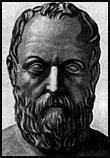Terence

Terence was born in Carthage (Africa) in about 190 BC. He was transported to Rome as a slave. His master, Terentius Lucanus, was so impressed by the intelligence of his new slave that he gave him an education and then set him free.
Terence wrote six plays: Adelphoe (The Brothers), Andria (The Girl from Andros), Eunuchus, Heauton Timorumenos (The Self-Tormentor), Hecyra (The Mother-in-Law) and Phormio.
Although they were not very popular at the time, Terence is now considered to be one of the most important writers of the Roman Empire. His work was praised by Scipio Aemilianus Africanus and Laelius Gaius but only one of his plays, Eunuchus, enjoyed any success during his lifetime.
According to Diana Bowder: "His (Terence) highly complex intrigues, subtle studies of emotional, familial, and even educational issues, immensely elegant verbal characterization, chase and sober use of language, polemical and self-justicatory prologues, devotion to comic irony as his chief form of humour and abandonment of much of the element of music and song so important to Plautus were all likely to cost him popular favour."
Terence's work reflects the humanitas view of life (a belief that all humans, whatever their race or nationality, should be friends).
Terence died in 159 BC.
Primary Sources
(1) Terence was a Roman slave from Carthage who later became a famous writer. In Terence's play Adelphi, Micio, a slave gives his opinion on how people's behaviour should be controlled. (c. 160 BC)
The man who keeps to the path of duty through fear of punishment will be honest just as long as he thinks he'll be found out. If he think's he can get away with something undetected, then he'll be back to his tricks. But the man who is attached to you by affection is anxious to treat you as you treat him, whether you're there or not... A man who can't do this should admit that he cannot control children.
